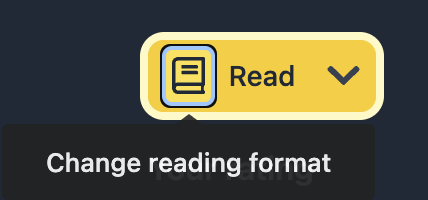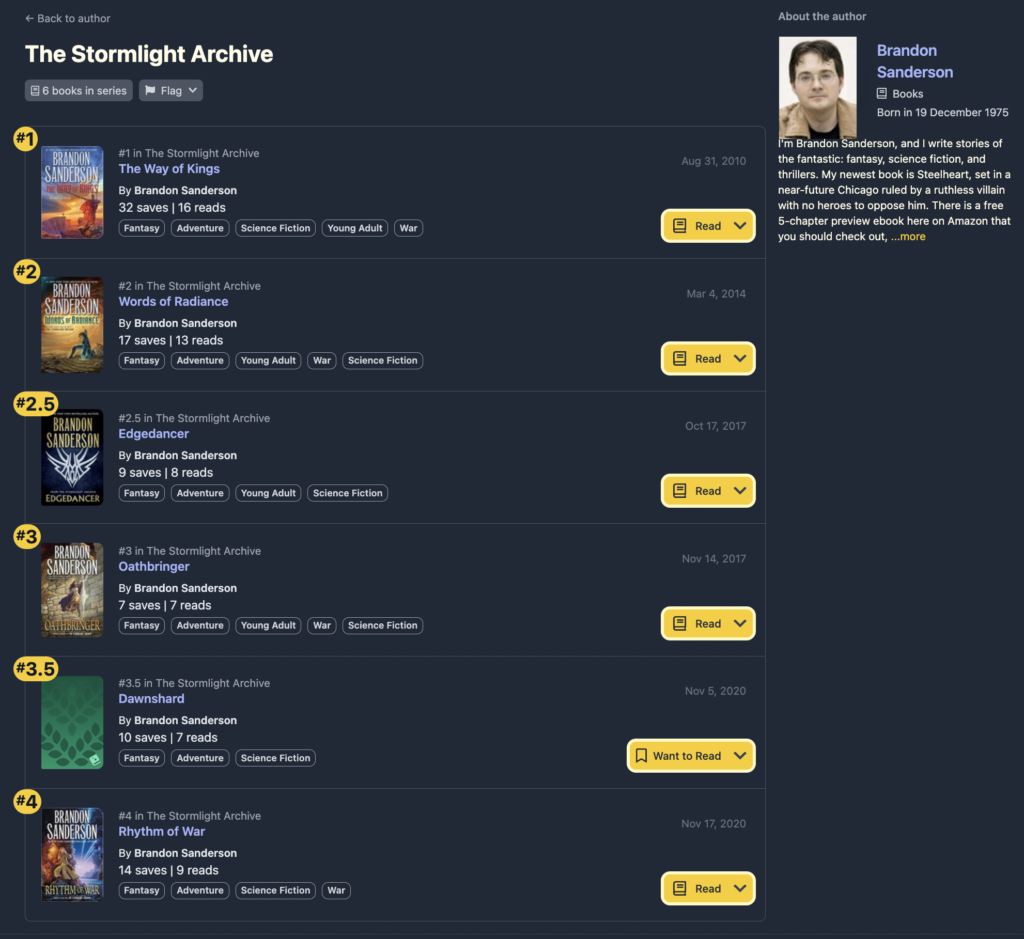Books vs Editions: How We’re Organizing Data Around Readers First
By Adam Fortuna

When we first started talking to readers, one of the biggest questions I had was around the role of editions in their libraries.
- Was it important that each book tracked on Hardcover be the exact edition that they read?
- How important was it to show the exact cover that the reader read
- Was setting the edition a proxy for setting some other data about the book that was more important: like if it was an audiobook or text?
- Do you read multiple versions of the same book?
- Do you want to track ownership of your books at the book level or at the edition level?
After talking with dozens of people about this topic the results were all over the place. Preferences ranged from wanting to track everything down to the smallest detail, to just tracking the book and not caring at all about the edition.
Well, today we’re excited to share that editions are now on Hardcover! We still have more work to fully integrate these, but we’re on a path that should allow for (almost) every answer received.
Editions on Hardcover!
Here’s how we’re handling editions on Hardcover. Some of this is already released and usable today, some are still in the works. For both cases, feedback is welcome (join our Discord and let us know what you think!)
First, we want to only have one primary page for every book. Regardless of which edition you read, you should be able to see your rating and all of your friends’ ratings and reviews in one spot.
Second, each book has many editions. As of today, we have 437,108 books in our database with 1,036,129 editions. Many books just have one edition, while others (like Harry Potter and the Sorcerer’s Stone) have hundreds.

Third, whenever you track a book (want to read, read, add to a list, etc), you can track which edition of the book you want (or you will be able to. This feature is still in the works right now).
If you imported your data from Goodreads, we’re already saving the edition from there.
Lastly, you can skip edition tracking altogether and just track format if that’s what matters most to you. Just click on the book icon in the book button to toggle between different formats




When you do this, behind the scenes we’ll associate your reading of this book with the most popular text edition or audio edition of that book. You can skip searching for the exact edition if this is enough information for you.
Saving data at this level also makes it possible to have beautiful pages for book series–something we heard from the start as being important (and a feature I use on Goodreads all the time).

These all relate back to the book, not the edition. Whether you listened or read, these are the books that are part of the series. There’s still so much we can do on this page, but we’re excited that it’s gotten to the point of being usable for series discovery.
You can’t select an edition yet, but that’s near the top of our list. We’re still loading in data, but once that’s ready we’ll let you know!
How We Decided on This
There were common themes that almost everyone was interested in:
Readers want to see reviews for the book, not the edition
When I read a review about a restaurant and someone complains about the struggle to find parking on a busy street, I immediately skip it. While valet could make a better experience for a customer arriving by car, it doesn’t change the experience of those who walked to dinner.
The same is true for books vs editions. The heart of a rating or review is around the source material–not the platform by which it was presented. If edition mattered most, then reviewers reading advanced review copies (ARC’s) of books would constantly be talking about how bad the spacing and margins were (seriously, why does that always happen?).
All reviews and ratings on Hardcover trace back to a book. A book has many editions. Perhaps the original hardcover release, the first paperback, a 2nd edition paperback, a Spanish translation, an audio cassette tape, a CD audiobook, a digital audiobook version, another digital audiobook with a cast rather than a narrator, and enough ebook variants for every platform.
Our aim with Hardcover is to organize all of these into a single page that represents the book. When someone is looking at a review or rating for a book, the edition rarely matters. It may come into play if you’re comparing similar editions and looking for which to choose (abridged vs not, which audio narrator, etc), but most of the time that’s after you’ve chosen to read the book in the first place.
We’re focused on that step first: when you’re deciding if you’re going to read it now, read it later, or pass on it.
A Book Doesn’t Exist
Every book you’ve ever read is just an edition. In that way, there is no definitive version of a “book” outside the minds of readers and authors.
When we show a book on Hardcover, that book represents all editions of it. We’re doing the work of organizing together all similar editions into the same “book” that we show.
Let’s look at an example: The Handmaid’s Tale.
The Handmaid’s Tale was written by Margaret Atwood and released in 1985. It’s the 10th most saved book on Hardcover (right between #9 The Great Gatsby and #11 Animal Farm).
Since its release, there have been at least 71 different editions of The Handmaid’s Tale. Everyone that’s read this book has read one of these 71+ editions.
But looking at the reviews they’re the same. They all focus on content, not the cover. On the story, not the paper stock.
Back in 1964, Marshall McLuhan dug into a related subject. His hypothesis was that the medium is the message – later writing a book with the same name. His premise is that the medium for any media dictates more than the message itself. It determines who will read it, how they will connect with it, the associations we build with the content itself, and much more.
The content of the medium is a message that can be easily grasped and the character of the medium is another message which can be easily overlooked.
The Medium is the Message on Wikipedia
Anyone who’s ever read a book and listened to the audiobook knows this to be true. You experience both of these in different ways and make unique connections from both experiences.
On Hardcover we’re trying to do both. Today that means audio vs text. Later on, that could mean brail or other formats that readers can experience the same message in different ways.
This only goes so far. If someone converts a novel into a graphic novel, that’s not another edition of the same book – that’s an entirely new book. They both share the same source material but are different enough that we organize them separately.
Edition Next Steps
For now, we show all mediums (editions) grouped together when looking at reviews but plan to allow people to drill down to reviews specific to an edition if you’re so inclined.
There’s a lot still to do and a bunch still to research.
- Allow readers to select a specific edition for their library and for lists.
- Determine which covers to show where. Do we show the readers cover everywhere? Do we show the default cover everywhere?
- Figure out how to handle when a reader reads multiple editions of the same book.
- Understand if showing rating/reviews make any sense at an edition level, or if we want to stay with book-only reviews.
I’m optimistic about this setup so far!
Side note: if you’d like to help out, the best thing you can do today is mark any duplicate books, authors, or series on Hardcover. That helps us group editions into singular books on the site. Pick a favorite author of yours and check out how it looks!
